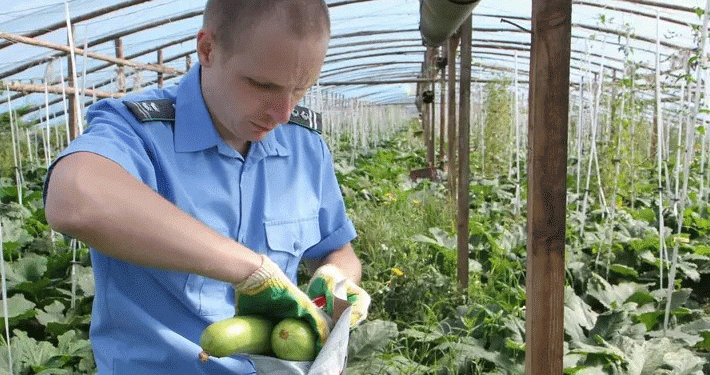Farmers, agronomists, and agricultural engineers in the Krasnoyarsk region are facing a critical issue as recent inspections have uncovered dangerous levels of nitrates and pesticides in greenhouse-grown vegetables. Specialists from the Federal Service for Veterinary and Phytosanitary Surveillance (Rosselkhoznadzor) conducted tests on vegetables from local greenhouses in the Berezovsky and Yemelyanovsky districts, leading to alarming findings.
The inspections targeted greenhouse operations in the villages of Yesaulovka and Kuvarshino. In Yesaulovka, cucumbers grown over 73.4 hectares were found to contain excessive levels of nitrate nitrogen and imidacloprid, an active ingredient in insecticides. Similarly, in Kuvarshino, cucumbers and zucchinis cultivated on 39.3 hectares showed high nitrate content. These findings prompted Rosselkhoznadzor to notify the regional prosecutor’s office and Rospotrebnadzor (the Federal Service for Surveillance on Consumer Rights Protection and Human Wellbeing), highlighting the potential risk of unsafe produce reaching Krasnoyarsk’s market shelves.
Nitrate nitrogen, while naturally occurring in soil, can become harmful at high concentrations. Elevated nitrate levels in vegetables are often a result of over-fertilization. Consuming such produce can lead to health issues, including methemoglobinemia, a condition that affects the blood’s ability to carry oxygen. Imidacloprid, on the other hand, is widely used to control pests but poses risks if residues exceed safe limits, potentially causing neurological and developmental issues in humans.
The discovery of these contaminants has significant implications for agricultural practices in the region. It underscores the need for rigorous monitoring and regulation of pesticide use and fertilization practices to ensure the safety of produce. Other regions have implemented stricter controls and integrated pest management (IPM) practices, which combine biological, cultural, and mechanical methods to reduce reliance on chemical pesticides. According to the European Food Safety Authority (EFSA), such integrated approaches have successfully reduced pesticide residues in produce across the EU, setting a valuable example for other regions.
Local authorities are now tasked with addressing this issue. The Krasnoyarsk prosecutor’s office and Rospotrebnadzor will work to ensure that contaminated vegetables are removed from circulation and that preventive measures are implemented to protect consumers. This incident also highlights the importance of transparency and communication between agricultural producers and regulatory bodies to maintain public trust and food safety standards.
The detection of high nitrate and pesticide levels in greenhouse vegetables near Krasnoyarsk serves as a critical reminder of the importance of stringent agricultural practices and regulatory oversight. Ensuring the safety of produce is essential for protecting public health and maintaining the integrity of the agricultural sector. By adopting comprehensive monitoring and integrated pest management practices, regions can mitigate such risks and promote sustainable, safe farming methods.












